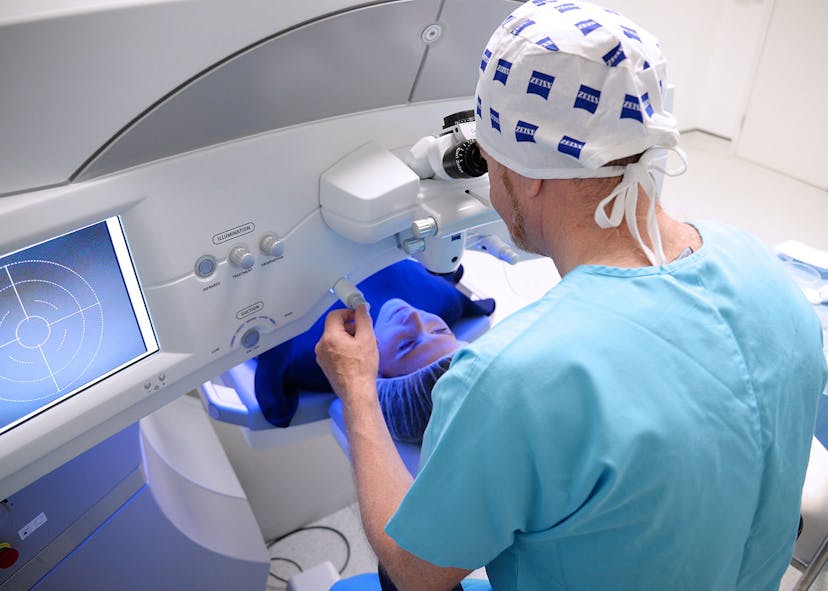
Laser Eye Surgery: The Patient's View
We understand that the thought of laser eye surgery can be daunting. Especially when you log onto the internet and you start reading stories about how people became blind due to having the surgery.
It's a myth! Laser eye surgery is actually one of the safest procedures in the world. It is actually safer to have the surgery done rather than wear contact lenses for the rest of your life.
We interviewed one of our patients, Mr Kyri Andreou, who underwent PRK (Photorefractive keratectomy) with 15 distinctive questions to help anyone else considering laser eye treatment.
Here's what he had to say about his experience...
1. Does Laser Eye Surgery Hurt?
PRK had slight discomfort for a couple of days post-surgery
2. When Did You Have The Eye Procedure at My-iCare In London?
March 2019
3. How Long Have You Worn Glasses Or Contacts?
Contacts for 10+ years
4. When Did They Most Annoy You?
At night, as soon as I woke up, also on holiday.
5. How Long Did You Consider Laser Eye Surgery For?
A few years

6. Take Us Through Your Experience Of The Consultation. What Tests Were Done?
Many tests were done on the eye to find out the suitability. Tested eyesight, dryness and overall condition of my eyes.
7. Take Us Through Your Experience Of The Surgery.
Very straightforward, came in the morning and was prepped for surgery. It lasted about 15-20 minutes in total. There was no pain or discomfort on the day of surgery.
8. What Made You Think “Yes, I Want To Have Laser Eye Surgery?”
The thought of not having to wear glasses/contacts every day.
9. What Was Your Vision Like Right After The Surgery?
I could see clearly and a lot better straight away
10. How Would You Describe The Healing Process?
There was discomfort and a slight blur in my vision for a couple of days but
overall not bad.
11. What Was Your Vision Like 1 Week After?
Nearly perfect, a slight blur.
12. What Is Your Vision Like Now?
Completely clear.
13. Did You Have Any Concerns Before Or After The Procedure?
I was worried about post-surgery recovery.
14. Talk Us Through Your First Follow-Up Appointment.
My eyes were tested again, all the same tests done before surgery.
15. Why Would You Recommend Laser Eye Surgery To Those Who Wear Glasses/Contacts?
Best money well spent, couldn’t imagine life without it now.
We Offer A Free Scan
Still unsure? Here at My iClinic, we offer a FREE eye scan for people interested in
finding out more about laser eye surgery.
These scans will tell you about your eye and usually confirm that laser eye surgery would give you normal vision.
PRK (Photorefractive Keratectomy): A Swift Overview
PRK, which stands for Photorefractive Keratectomy, is a type of laser eye surgery designed to correct refractive vision errors such as nearsightedness (myopia), farsightedness (hyperopia), and astigmatism. This procedure reshapes the cornea's surface to enhance visual clarity without relying on glasses or contact lenses.
Procedure Process:
- Preparation: The eye is numbed with eye drops, and the surface layer of the cornea (epithelium) is gently removed or brushed aside to expose the underlying corneal tissue.
- Laser Reshaping: An excimer laser is used to precisely reshape the cornea by removing microscopic layers of tissue. The laser's energy is applied according to a personalised treatment plan created by the eye surgeon.
- Healing Phase: The cornea begins to heal naturally without the need for stitches. A protective contact lens may be placed on the eye temporarily to promote comfort during the initial healing period.
- Recovery: Over a few days to weeks, the corneal surface regenerates, and vision gradually improves. The use of eye drops and adherence to post-operative instructions is crucial during this phase.
Key Benefits:
- Visual Clarity: PRK aims to provide improved vision by correcting refractive errors, and reducing or eliminating the need for glasses or contact lenses.
- Permanent Correction: The reshaping of the cornea is intended to provide long-lasting results, potentially reducing the need for future interventions.
- Minimal Risk of Flap Complications: Unlike LASIK, PRK doesn't involve creating a corneal flap, lowering the risk of flap-related complications.
Considerations:
- Healing Time: PRK typically involves a slightly longer recovery period compared to LASIK, as the corneal surface needs time to regenerate.
- Discomfort: Patients may experience some discomfort during the initial healing phase as the epithelium regrows.
- Suitability: PRK might be recommended for individuals with thinner corneas or those who engage in activities with a higher risk of eye trauma.
Is PRK Right for You? To determine if PRK is a suitable option for your vision needs, it's essential to consult an experienced eye surgeon. They will assess your eye health, refractive error, and other factors to recommend the most appropriate treatment plan for achieving clearer vision.
Find out more by Speaking to our team









